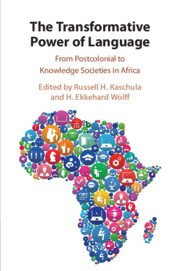Book contents
- The Transformative Power of Language
- The Transformative Power of Language
- Copyright page
- Contents
- Figures
- Tables
- Contributors
- Preface
- Abbreviations and Acronyms
- Introduction
- Part I Mental Decolonisation and Cultural Diversity
- Part II Multilingualism and Intellectualisation of African Languages
- Part III Digitalisation and Democratisation of Knowledge
- Part IV Interlingual and Intercultural Cross-Fertilisation
- 14 Orality in the Digital Age
- 15 Interpreting Research in South Africa
- 16 Exploring the Potential of Increasing Epistemological Access for University Students of African Languages through the Translation of English Academic Texts
- 17 Translation in Foreign Language Teaching
- Index
- References
15 - Interpreting Research in South Africa
Where to Begin to Transform?
from Part IV - Interlingual and Intercultural Cross-Fertilisation
Published online by Cambridge University Press: 18 September 2020
- The Transformative Power of Language
- The Transformative Power of Language
- Copyright page
- Contents
- Figures
- Tables
- Contributors
- Preface
- Abbreviations and Acronyms
- Introduction
- Part I Mental Decolonisation and Cultural Diversity
- Part II Multilingualism and Intellectualisation of African Languages
- Part III Digitalisation and Democratisation of Knowledge
- Part IV Interlingual and Intercultural Cross-Fertilisation
- 14 Orality in the Digital Age
- 15 Interpreting Research in South Africa
- 16 Exploring the Potential of Increasing Epistemological Access for University Students of African Languages through the Translation of English Academic Texts
- 17 Translation in Foreign Language Teaching
- Index
- References
Summary
South Africa’s approach to knowledge has been described as being ‘derivative, rather than leading (Leibowitz, 2017: xx). Academics from the global South tend to consume Western theories rather than generating their own theories (De Souza, 2007: 135) – hence, their engagement with calls to transform and ‘decolonise’ the curriculum. Questions that need answering include the following: How does decolonisation relate to content, pedagogy and assessment? What do we base our curricula on – epistemic practices developed elsewhere in the world? If so, how do we apply international best practices without ignoring indigenous and locally relevant research? Key to transforming the curriculum in Africa’s complex linguistic contexts is multilingualism, as embodied in the work of translators and interpreters. In South Africa post transition, for instance, interpreters in court, conference and educational contexts are vital to the functioning of South Africa as a multilingual country. But to what extent is this rich praxis reflected in research in interpreting in South Africa, and has it assisted academics to derive new theories? This chapter aims to describe trends observed in the field of Interpreting Studies in South Africa over the past ten years (2006–2016) on the premise that decolonisation must be preceded by a thorough description of the discipline.
Keywords
- Type
- Chapter
- Information
- The Transformative Power of LanguageFrom Postcolonial to Knowledge Societies in Africa, pp. 304 - 325Publisher: Cambridge University PressPrint publication year: 2020

